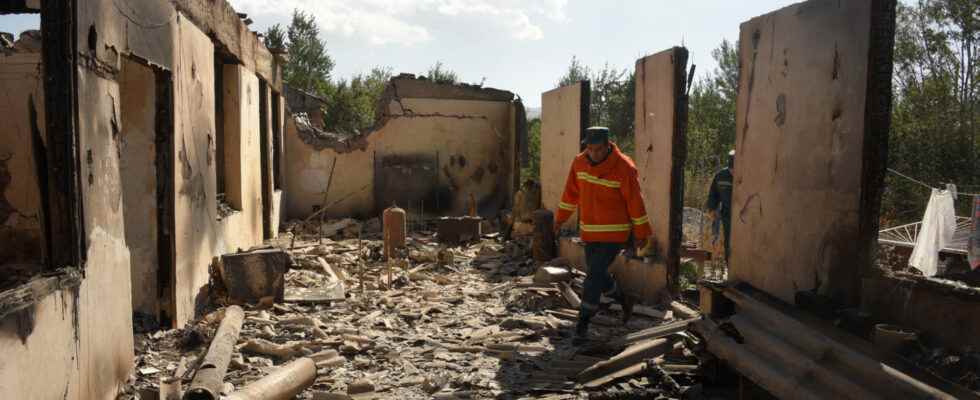Armenia on Wednesday accused Azerbaijan of occupying new Armenian territories, the second day of a military escalation between the two neighbors that has left more than 150 dead, jeopardizing fragile peace talks. These clashes, which erupted overnight from Monday to Tuesday, are the most intense since a war in 2020, lost by Armenia, which had killed more than 6,500 people. At least 105 Armenian soldiers have been killed, Prime Minister Nikol Pashinian announced on Wednesday, more than double the toll announced on Tuesday.
Armenia accuses Azerbaijan of occupying 50 km2 of its territory
“The enemy who has occupied 40 km2 of Armenian land since May now occupies 10 km2 more,” denounced Nikol Pashinian, urging the Azerbaijani forces “to leave”. Azerbaijan, which announced 50 soldiers killed in its ranks, also said on Wednesday that it wanted to hand over to Yerevan the bodies of 100 Armenian soldiers killed. Russia, a regional power which considers the Caucasus as its backyard, announced a truce on Tuesday morning, but both sides immediately accused each other of having violated it.
This new deadly outbreak comes as the attention of Moscow, traditional mediator in the region, is monopolized by its military intervention in Ukraine. The Armenian Defense Ministry said on Wednesday that Baku “has resumed its attacks with artillery, mortars and large-caliber weapons in the directions of Jermuk, Verin Chorja”, two Armenian localities near the Azerbaijani border.
Two rival ex-Soviet republics
“It was impossible to stay in our houses, because there were already serious bombardments (…). We thought that our houses were going to collapse”, told AFP Vardanouch Vardanian, 66, resident of the Armenian village of Sotk, located near the border with Azerbaijan. The Azerbaijani Ministry of Defense for its part affirmed that the Armenian forces had shelled during the night its “positions in the areas of Kelbajar and Lachin”. Baku also accused Armenian forces of firing howitzers at three Azerbaijani villages. Armenia has denied these accusations.
Armenia and Azerbaijan, two rival ex-Soviet republics, have clashed in two wars over the past three decades for control of Nagorny Karabakh, a mountainous region they dispute. The resumption of such bloody fighting illustrates how explosive the situation remains, both in Nagorny Karabakh and at the official borders between the two countries.
The international community concerned
Armenia called on the international community to react, while the European Union, the United States, France, Russia, Iran and Turkey expressed their concern and called for an end to the violence. The German government also urged Armenia and Azerbaijan on Wednesday to end their conflict which threatens the security of the entire “region”.
Visiting Kazakhstan, Pope Francis said he was “concerned” and called for “praying so that in these territories also peaceful confrontation and harmony prevail over quarrels”.
Russia’s role as mediator called into question
Russia deployed peacekeepers to Nagorny Karabakh in November 2020. But since its offensive in Ukraine, Moscow has been isolated on the international scene and its role as mediator has been called into question. In recent months, the EU has taken the lead in finding a peace agreement. These negotiations have made it possible to make timid progress on the issue of border demarcation and the reopening of transport routes between the two countries. Armenian leaders Nikol Pashinyan and Azerbaijani Ilham Aliyev have met in Brussels three times this year, most recently on August 31.
But the new clashes “have nullified” the progress made, said Guela Vasadze, a political scientist at the Georgian Center for Strategic Analysis. Relations between Yerevan and Baku remain poisoned by the question of Nagorny Karabakh, an enclave mainly populated by Armenians who seceded from Azerbaijan with the support of Armenia. After a first war that killed more than 30,000 people in the early 1990s, Yerevan and Baku clashed again in the fall of 2020, in battles that claimed the lives of more than 6,500 people.
